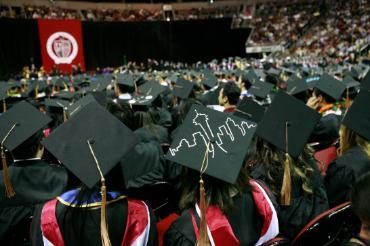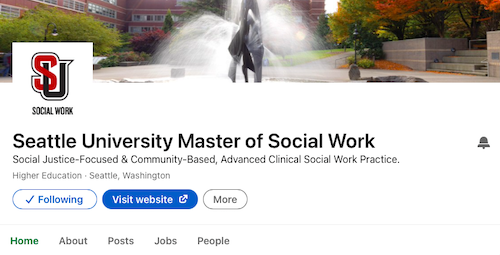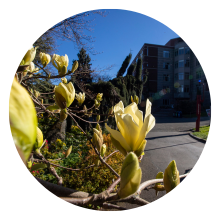
Spring 2023 Social Work Newsletter
Congrats, Graduates!
Letter from Dr. Derr to BSW Graduates:
Congratulations to the Seattle University Bachelor of Social Work CLASS OF 2023!!!! And congratulations to your loved ones who share this with you. I would like to take this opportunity to express my admiration, appreciation, and my gratitude to you. In many different ways, you have taken up the challenging and fulfilling path of working for a more just and humane world, in a context in which that can seem a very daunting task. BSW Class of 2023, what a pleasure it has been to walk with you on your journeys. You are unique in your compassion for the suffering of the world, unique in your dedication to working to change oppressive systems and dynamics of human interaction, and unique in your optimism, believing that change can happen and is worth fighting for! I can’t think of anything I would rather do for my career than to support social work students in their efforts to create a better world. Social work IS social justice work. And you have been living the values of social justice in action. You are all engaging with the world through our social work disciplinary lens, using the knowledge and skills you have gained through your Seattle University education and your own life experiences to work for a more just and humane world. Thank you for taking your learning out of the classroom and doing great work in the world. I raise my squishmallow to you! :) You deserve all the respect and accolades we can muster. Be proud of yourselves and each other. Give yourselves and each other the admiration you deserve. There is a lot to do, so use your powers for good, get to work, and take care of yourselves and each other!
Dr. Amelia Seraphia Derr
BSW Program Director
Associate Professor
Message from Dr. Kang to MSW Graduates:
Dear MSW Class of 2023,
Congratulations! You made it! I hope you feel proud of your achievements. You did it, as J.F.K. said, “not because it is easy but because it is hard.”
Before we launch you, MSW Class of 2023, I would like to share a few words with you.
You may recall the first day of your orientation when you started this journey together. One question that was asked of you was about your purpose. “Why are you here? What is your purpose?”
I hoped that you kept those questions in your mind as you pursued this complex and arduous program because as long as you are clear about your purpose, there is nothing that can detract you from succeeding.
As students of this program know, the MSW program is a highly demanding program that involves completing 66 credits of courses for 2-year students, and 39-credits for Advanced standing students, while completing a rigorous field practicum program.
This is a big commitment that takes rigor and persistence. In addition, the pandemic had a big impact on your life, both on and off campus.
But you showed all of us, and perhaps most importantly to yourselves, that you kept your purpose and rose to meet whatever the challenge that was thrown at you. You indeed stepped up, and I applaud you for that.
Now, Class of 2023, you are ready to embark on a new journey as professional social workers in an environment that needs you more than ever.
The historic pandemic laid bare the inequities and injustice in our society. Structural oppression is more clearly present than ever, and its consequences most undeniable. The country has been seething with righteous anger at continuing and violent racism and white supremacy. We as a country continue to suffer serious attacks on our very foundation of democracy. Sometimes it may seem just overwhelming. But I urge you to know your purpose as a social worker at this time when our world is ripe for revolutionary change.
What is your purpose as a social worker?
Social workers must be clear about their purpose because the lives of the people that we are entrusted to work alongside, and the people’s journeys that we are graced to be part of, are most complex. And because as social workers, we work not only to help and heal but also to challenge and change —because we strive to enact social justice where injustice and inequity persist.
This, my new colleagues, is the most important time for social workers to be clear about our mission, our purpose.
The mission of our program is to educate students for social justice-focused and community-based advanced clinical social work practice. The program seeks to advance equity in access to excellent clinical social work practice for historically marginalized populations by preparing competent and effective practitioners who restore, maintain, and enhance human and community well-being with unwavering attention to social and economic justice.
Now as you are ready to join the profession, I am thrilled to see that you are ready for that.
MSW Class of 2023, welcome to the social work profession. Congratulations!!
Dr. Hye-Kyung Kang
Chair, Dept. of Social Work
Director, Master of Social Work Program
Professor
Announcements & Spring Quarter Review
Social Work Student Awards
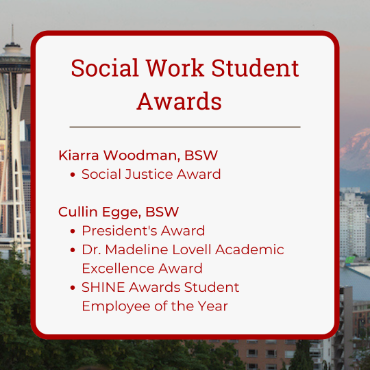
Bachelor of Social Work Student Capstone Project Topics
In May, graduating BSW students presented their final Capstone projects. See students' Capstone topics below:
-
Lilian Jeanne: Combining EMDR and Yoga to Promote Holistic Healing
-
Giles Adams: Envisioning Success at Friends of Youth The Landing
-
Shriya Rao: Evaluating High School Mental Health Services
-
Asha Fuson: Homelessness & Health Needs at Sound
-
Mackenzie Lawrence: Case Study of Burnout at Lifelong
-
Kiarra Woodman: Analyzing Emergency Service and 9-1-1 Use in Connection to Social Service Referral
-
Katelyn Goetzinger: Housing-First and Engagement in Mental Health Services
-
Cullin Egge: Community Profile of Latino Gay Men with HIV in Seattle, WA
To our graduating BSW students, congratulations on completing this milestone and contributing to the advancement of our field!
NEW! Seattle U Master of Social Work on LinkedIn!
Follow our new Seattle University Master of Social Work page on Linkedin! We are sharing content regularly related to our social work department, social justice, and social work in Seattle. Follow to stay up to date on social work department news and events and to network with the Seattle U social work community!
Faculty Updates & News

Sam Harrell, an instructor with the Department of Social Work, recently published their second article on Moral Reconation Therapy, "Moral Reconation Therapy: Incompatible with Council on Social Work Education Competencies?" in Advances in Social Work. Moral Reconation Therapy (MRT) is an intervention technique frequently used in correctional settings that attempts to address moral reasoning and problematic behaviors. MRT has been used in countries across Washington state, including Whatcom, Snohomish, King, Mason, Kittitas, Pierce, Thurston, Pacific, Franklin, Columbia, Walla Walla, and Spokane counties. Mx. Harrell's first article on Moral Reconation Therapy, "'The Broker of Reality': A Scoping Review of Moral Reconation Therapy" was published in August 2022 and aimed to identify evidence-based literature supporting Moral Reconation Therapy, concluding that Moral Reconation Therapy's "evidence claims are not supported by peer-reviewed research" (Harrell et al., 2022).

This quarter, SU social work instructor Sam Harrell also published, "Teaching beyond trans-competency: Exploring trans-affirming pedagogy through applied case studies" in the Journal of Sociology and Social Welfare. The paper shared two applied case studies that social work instructors can use to teach trans-affirming, anti-oppressive practice. In light of genocidal legislation targeting transgender and gender expansive individuals and their communities, the authors write,
"Social work classrooms must facilitate critical, open, and trans-affirming education on how to support trans communities. As social work instructors, we have seen students and faculty with uninterrogated anti-trans bias resist trans-affirming education...Social work educators have an obligation to dispel these myths and to offer consistent and affirming content that recognizes and makes visible trans lives across all areas of practice...Moreover, schools of social work should reinforce these efforts through their implicit and explicit curriculum and their own expressions of committment to listening and always striving to do better in their support of TGE students, faculty, and communities" (Harrell, Mountz, Zaman, 2023).
See the full article for the authors' applied case studies and to learn more about the relevance of trans-affirming pedagogy in social work education.
 Social workers face high rates of burnout compared to other professions. In May, BSW Program Director and Associate Social Work Professor Dr. Amelia Seraphia Derr gave a presentation for the Seattle University community on radical resilience and sustaining commitment to social justice work. Dr. Derr's presentation responded to the current crisis of mental health among providers and provided students with education on how to enjoy a sustainable and generative career.
Social workers face high rates of burnout compared to other professions. In May, BSW Program Director and Associate Social Work Professor Dr. Amelia Seraphia Derr gave a presentation for the Seattle University community on radical resilience and sustaining commitment to social justice work. Dr. Derr's presentation responded to the current crisis of mental health among providers and provided students with education on how to enjoy a sustainable and generative career.

In May, BSW Program Director and Associate Social Work Professor Dr. Amelia Seraphia Derr presented at the European Social Work Conference in Prague, Czech Republic on helping students prepare for careers in social work by focusing on resilience and career sustainability in social work education. The conference was held by the International Federation of Social Workers and the Society of Social Workers of the Czech Republic.
 In May, Social Work Department Chair, MSW Program Director, and Professor Dr. Hye-Kyung Kang presented jury-selected paper, "Social justice-focused mental health practice: An integrative model for clinical social work" at the European Social Work Conference, held in Prague, Czech Republic.
In May, Social Work Department Chair, MSW Program Director, and Professor Dr. Hye-Kyung Kang presented jury-selected paper, "Social justice-focused mental health practice: An integrative model for clinical social work" at the European Social Work Conference, held in Prague, Czech Republic.
 In April, Social Work Department Chair, MSW Program Director, and Professor Dr. Hye-Kyung Kang co-facilitated "Education as the Practice of Freedom," a Racial Equity Summit Freedom School session with Darozyl Touch, College of Arts and Sciences Assistant Dean for DEI. See the description of the session below:
In April, Social Work Department Chair, MSW Program Director, and Professor Dr. Hye-Kyung Kang co-facilitated "Education as the Practice of Freedom," a Racial Equity Summit Freedom School session with Darozyl Touch, College of Arts and Sciences Assistant Dean for DEI. See the description of the session below:
In this session, we invite participants to explore bell hooks concept of “education as the practice of freedom” from her seminal book, Teaching to Transgress. Integrating hooks’ concept of liberatory education, we collectively vision for liberated futures through dialogue. To bridge both theory and praxis and the mind-body connection, we close by embodying hooks’ conception of self-actualization in dialogue with Buddhist philosophy and meditation practice.

In April, four MSW students (Allie D, Alec D, Nanette J, and Simone S) joined faculty member Sam Harrell’s archival research project investigating Oregon and Washington social workers' role designing and administering "medical detention facilities" for suspected sex workers in the Progressive Era. Students are researching physical and digital archives, learning archival data collection and management methods, and exploring local histories. To learn more about this era of criminalization, check out this article by historian Scott Stern and this article by feminist social work scholar Stéphanie Wahab. To learn more about how to provide equitable care to sex workers as future clinicians, check out the Equitable Care Certificate, created by sex workers, sex work-affirming therapists, and sex working therapists.
Advice from Alumni for Graduating Students

We sent a survey to our Seattle U social work alumni to give an opportunity for them to share their advice and tips with graduating undergraduate and graduate social work students. Here are some of their responses!
- What advice would you like to share with BSW students graduating this spring?
-
"Go get your MSW. Just do the 10 month advanced standing and get it done. You’ll thank me later."
-
"The biggest piece of advice I would give to BSW graduates is to take whatever time you need to figure out who you are— outside of your degree, outside of your preferred modalities, and outside of your career. Any career in social work, or any helping profession, can easily become who you are because of how much it requires of our humanity, compassion, and time. However, you are more than your job, and if you base your worth or success on your work with clients, you will inevitably be disappointed. You deserve to have a life and enjoyment outside of your career because you are more than just a social worker."
-
- What advice would you like to share with MSW students graduating this spring?
- "You're graduating into an amazing market for MSWs - don't be discouraged if you aren't graduating with a job!"
- "Two of the things I care most about are 1) the quality of supervision and 2) the work culture. There's no harm in interviewing your supervisors about their style, how they support and mentor, and their style of giving feedback. It's important to me to work in a place where my colleagues are fulfilled, so I encourage asking to speak to 2-3 current staff to hear how they feel about the place."
- "Lots of openings. Don't be afraid to negotiate a higher salary"
- "For graduating MSWs, I would recommend keeping the bigger picture of your career in mind. One of the best pieces of advice I received from a supervisor during my MSW program was: “You can do everything, just not right now.” An MSW opens many doors, and that can feel overwhelming. It was useful to me to keep in mind that whatever job I took out of grad school didn’t have to be my forever job. One of the best things I’ve done thus far in my career remains open-minded and allow myself to consider various opportunities, even if they didn’t necessarily align with what I thought I “should” or “would” be doing after graduate school."
- "Be aware of the potential harm you may cause clients. Be aware of your position of power you hold. And congrats, you did it!!"
- "Apply for your LSWAIC (associate LICSW license) a month before you start applying for jobs. You will find a job quickly; don’t worry."
- What is something you wish you could share with your younger self when you started your social work career after graduation?
- "As dismal as it sounds, I wish I would have taken more time to internalize the idea that you can’t save everyone. I worked in a community mental health center the year after graduating with my MSW, and it was emotionally exhausting to hear about the lack of support and resources that were available for the most vulnerable people. I took this to heart and thought that if I simply worked harder I would be able to find some solution; however, I’m just one person in a very broken system doing my best. I had to learn to let that be enough because I couldn’t fix systemic issues by burning myself out."
- "It's okay to try out different levels of social work (macro vs. mezzo vs. micro) - you're not wedded to one just because that's what you spent the last two years studying."
- "You may feel like you don't have enough training in evidence-based treatments. Don't sweat it. If the foundational skills are there, the protocols will come more naturally to you later regardless. Research what the main protocols are for the diagnoses you're most interested in, figure out which treatments are usually used, and read some self-help books on the subject. They are great primers on treatment, and the books themselves often have materials (worksheets, "tools") that can be easily shared with patients. I recommend the workbook Mind Over Mood for CBT and the book The Happiness Trap for Acceptance and Commitment Therapy."
- "There is more to social work than case management"
- "Don't let the idea of having an advanced degree make your head big. Celebrate your accomplishment and honor your hard work without letting it blind you or make you think you are better than anyone else. Look at every interaction as an opportunity to practice, hone your skills, and become a better person/clinician. Every chance to serve is important for your development. Implementing clinical skills is not limited to client interactions only. Some of the most important and beneficial uses of social work skills come from utilizing them in the context of dealing with other practitioners, colleagues, and interdisciplinary team members. Great social workers are the heart of any organization because great social workers reach out and deliver warmth, support, and validation to all parts of the team. Especially to the team members that are least appreciated, least visible, and least recognized."
- "It wasn’t that long ago, but I would say “you did it. Don’t give up, keep trucking along”."
- Any other tips on licensure, job searches, CE, etc.? (Or anything else you wish to share?)
- "Find a good supervisor that you trust, personally and professionally. The licensure process is complicated and murky, so having someone who could walk me through it was invaluable!"
- "Licensure hours are going down! Take advantage of the supervision that's offered in community practice."
- "Get your LSWAIC as soon as you can. It’s not hard to apply for and to maintain. There are so many jobs out there for the taking. Be picky and take your time."
- "If there's a place you really want to work, but no job offerings when it counts, reach out for an informational interview with a current staff member. Make your interest known, and you can ask about turnover rates. A lot of community-based practices have pretty regular turnover, and if you can afford to wait a couple months it may be worth it in the long run. Come up with a system to track your CEs (total and by topic area). It's easier to space things out over the year than to cram in the last 1-2 months before they're due. Last, everyone talks about self-care. It can be really easy to put aside those active, creative self-care things you do and lean into the more passive, comfort-food kinds of self-care. I think it's okay to give yourself an adjustment period when you start working, and it's important to keep touch with those active forms of fulfillment. I'm thinking of art, dancing, music, shows, travel, sports, hiking... whatever that fills you up, even if it takes more work than TV bingeing."
- "You have 3 years to get licensure. Try to find a spot with at least another MSW"
- "Having a good supervisor who you will learn from is really important when choosing a job. If you get bad vibes from the supervisor, consider looking elsewhere."
Student Highlight, BSW: Katelyn Goetzinger
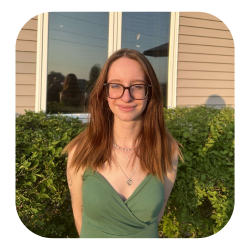
Are you involved in any on-campus groups, clubs, or activities and/or are you involved in any research?
I am currently a part of Student Executive Council, which has been a fantastic experience and a great way to build community. And while I’m not super active in any clubs, I try to go to events around campus that interest me. I recently when on a retreat through campus ministry which was very refreshing.
Have you received any awards or scholarships?
I am currently on the Bellarmine Scholarship and I have made the presidents’ list almost every quarter.
What year are you graduating?
I am graduating this June!
What inspired you to go into social work, and why did you choose Seattle University’s program?
I always knew that I was going to go into a helping profession, but when I started college I wasn’t quite sure of what path to take. I took a few social work class and I really loved the professors and the topics covered. I appreciated the anti oppressive lens that the courses are taught through. And I loved that I could combine social justice with whatever line of work I decide to go into. I also appreciate the ability to switch fields and I think it will allow me to pursue many passions and really be able to find my fit within this career.
What are your plans after graduation? Or what do you hope to do in social work after graduation?
I’m not certain about where I will end up. I currently am doing my practicum through Catholic Community Services and will probably end up with a case management job through them. I hope to move more into policy work throughout my career.
What is your practicum this year, and what population are you working with?
I am at the Bridge Shelter through Catholic Community Services. I work on housing case management. Which involves just trying to get folks all of the paperwork that they need to apply to housing. Our shelter is single adults as well as providing a few spaces for couples. They are mostly aged 30-60.
Do you volunteer or do any social work activities outside of school?
Not currently just because of how busy I am. I do work downtown and a large homeless population often comes into our store and I’ve found that through interacting with these folks I’ve learned lots of skills that can be carried over into social work. Since I’m seeing the direct impact of a lot of policies and the ways that our society marginalizes this group of people.
What has been the most rewarding or exciting part of your time in the BSW program and/or social work?
I think realizing all of the practical skills I’ve learned at my practicum and just becoming more confident in myself and my capabilities.
What personal strengths are you proud to bring with you as a social worker?
I am proud that I can bring my compassion, patience, and humility with me as a social worker.
Student Highlight, MSW: Ashley Smith
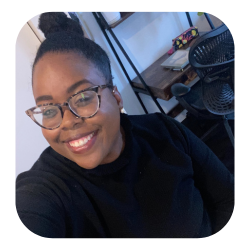
Are you involved in any on-campus groups, clubs, or activities and/or are you involved in any research?
Unfortunately, the advanced standing class and practicum schedule in addition to working part-time did not provide time for me to be involved in on-campus groups, clubs, or activities.
Have you gotten any awards or scholarships? We want the details!
I was awarded the Entrye-Scheingold Clinical Social Work Endowed Scholarship and the Clinical Social Work Equity Scholarship, both available through Seattle University. I was also awarded tuition assistance through my employer, Seattle Children’s Hospital. In total, I was awarded over 10,000 dollars which made a significant impact on the financial burden of pursuing higher education.
Where did you get your undergraduate degree and what did you study?
I got my undergraduate degree in Social Work from San Diego State University with a minor in corrections and case management.
What inspired you to go into social work, and why did you choose Seattle University’s program? (Feel free to talk about it here if you have prior experience in social work!)
I have been in the field of Social Work for over 10 years. I cannot explain what inspired me to go into Social Work, I just know this is what I am meant to be doing. I chose Seattle University for the small class sizes, social justice focused programing and the length of their advanced standing program- it was a rigorous 10 months and time really flew by. I put off returning to school for 6 years and it only took 10 months to earn my degree.
What are your plans for after graduation, or what do you hope to do in social work after graduation?
Heading into my 6th year at Seattle Children’s transitioning to a new role as a Mental Health Evaluator in the ED. I will earn my SUDP certification and LICSW with a goal to open a private practice that provides services to BIPOC adolescents and young adults.
What is your practicum this year, and what population are you working with?
My practicum was with Seneca Family of Agencies, at Summit Sierra High School. It was such a great placement. They provided a stipend, countless training opportunities and supervision. I was fortunate to serve a diverse clientele of wonderful and bright students. I will truly miss it.
Do you volunteer or do any social work activities outside of school?
I did not have time to engage in these activities and I plan to get back to volunteering now that I have more availability.
What has been the most rewarding part of your time in the MSW program?
The most rewarding part of my time in the MSW program was my practicum learning.
What’s one piece of advice you would give your younger self or future students if you could?
You’re not an imposter, you’re actually pretty amazing, you know what you’re doing and when you don’t it’s okay to ask for help! Also, know your worth!
Social Work in the Summer: Events, Trainings, & Ideas
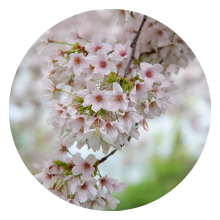
Free Social Work Trainings
For those interested in participating in trainings or workshops over the summer, here is a list of low-cost or free trainings:
- Washington State Society for Clinical Work (WSSCSW)
- "Recording: Clinical Documentation for a Post-Roe World"
- View-only registration, no Continuing Education (CE) credits provided ~ free
- View the WSSCSW Youtube for more free training videos, such as:
- Other trainings require a registration fee, but offer equity pricing to decrease costs. Some trainings offer CE credits.
- "Recording: Clinical Documentation for a Post-Roe World"
- Webinars - National Health Care for the Homeless Council (NHCHC)
- Most webinars are archived on the NHCHC website and accessible to watch. Some examples of webinars include:
- Northwest Mental Health Technology Transfer Center Network
(MHTTC) Training and Events- Check the Northwest MHTTC page regularly for training events happening this summer! Some events are virtual and may offer CE credits or a certificate of completion. Complete an interest form or register in order to attend.
Additional Social Work Organizations Providing Trainings
Also, check out this list of organizations that provide trainings for social workers organized by MSW Practicum Seminar Instructor and Field Liaison Alana Honigman for more trainings this summer!
- PESI
- Since 1979, PESI Inc., has provided cutting edge continuing education to professionals across the nation. We work alongside the world’s leading experts to create seminars, conferences, videos and books that meet the needs of adult learners. All of our continuing education seminars and products assure that professionals can meet the changing demands of their work by providing practical strategies, methods and interventions they can use immediately to improve the outcomes of their clients.
- Cascadia Training
- Since 2001 Cascadia Training has offered training to those in the helping and healing field. This includes Mental Health Counselors, Marriage and Family Therapists, Social Workers, School Counselors, Teachers, and Naturopaths.
- VTSC (Veterans Training Support Center)- Washington Department of Veterans Affairs Counseling & Wellness Programs
- The VTSC, a program found within the Washington Department of Veterans Affairs Counseling & Wellness Programs, is dedicated to raising awareness and understanding of trauma and related issues specific to veterans, such as invisible wounds like Post Traumatic Stress, Traumatic Brain Injury, and Moral Injury. We encourage all employers and organization leaders, whether in public, private, or higher education settings, to establish promising best practices that will empower veterans in their pursuit of personal, academic, and meaningful career goals. VTSC seeks subject matter experts to provide workshops through a classroom-based setting or a virtual platform.
- NICABM (National Institute for the Clinical Application of Behavioral Medicine)
- For more than 25 years, NICABM has provided training to more than one million health and mental health practitioners. We proudly provide continuing education for practitioners who are dedicated to being the best in their craft. Our goal is to develop programs that connect you with the top experts and the latest strategies in the field, to help you achieve better outcomes, more quickly with each of your clients.
- NASW-WA (National Association of Social Workers, Washington)
- Founded in 1955, the National Association of Social Workers (NASW) is the largest membership organization of professional social workers in the world. NASW works to enhance the professional growth and development of its members, to create and maintain professional standards, and to advance sound social policies.
- UW Medicine Harborview Behavioral Health Institute - TeleBehavioral Health
- Our TeleBehavioral Health 101 provided the basics of conducting telebehavioral health services. TeleBehavioral Health 201 focused on developing a broad knowledge base and skills for telebehavioral health care and digital health. The TeleBehavioral Health 301 series explored leveraging telebehavioral health to enhance quality of care in a variety of clinical arenas. In 2023, TeleBehavioral Health 401 will continue to explore new ways to enhance quality of care with TeleBehavioral Health for specific patient population and services, as well as provide information about developing telebehavioral health technologies and applications, and updates on telebehavioral health policy.
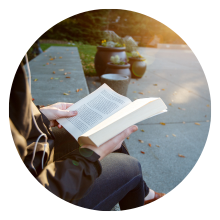 Reading Lists
Reading Lists
For those with more time to read this summer, here are some reading lists from our Seattle U social work faculty!
 Things to Do in Seattle
Things to Do in Seattle
We acknowledge that summer is often a necessary time for rest and meaningful self care for social workers. Whether or not you participate in social work trainings or engage with social work-related media this summer, we hope everyone in our social work community explores, rests, and engages in activities that to them feel nurturing, exciting, or rejuvenating.
For ideas of things to do in the Seattle area, check out our recent student blog by MSW student Sabrina Figueroa, "Soak Up Summer in Seattle". Sabrina shares some of her favorite summer things to do in the Seattle area, including seasonal fairs and festivals, recreation, sightseeing, and more!
Give us feedback for future newsletters!
Have feedback or ideas for future newsletters, or interested in writing a piece for future newsletters? Please fill out this survey!

